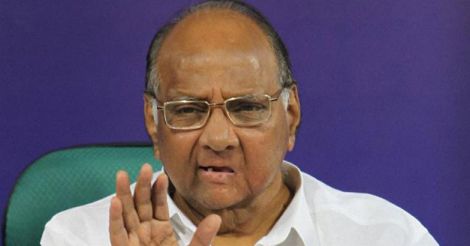The huge turnout of dignitaries from across the political spectrum for the 75th birthday celebrations of Sharad Pawar in Delhi has given rise to speculation that the political strongman may emerge as a consensual candidate for President's post when Pranab Mukherjee completes his first term in 2017.
However, Pawar laughs it off saying he had been often projected as a Prime Minister earlier. He says his only party does not have the numbers to even project his name.
The Nationalist Congress Party has just a dozen MPs out of 780 in Parliament and 40 MLAs in Maharashtra. The united progressive alliance to which Pawar's party belonged before the Maharashtra Assembly elections of 2014, too doesn't have enough numbers to get its own nominee through.
And even if UPA had those numbers and NCP was still part of the alliance, the Congress, which dominates UPA, would not be enthusiastic about projecting Pawar, especially after the strong comments he has made in his autobiography published at the time of the 75th birthday celebrations.
The speculation is that the presidential election of 2019 could become an interesting tussle as it had happened in 2002 when the NDA did not have its own majority, and had to develop a consensus.
Vajpayee, who wanted to carry his own NDA partners and others projected the name of Maharashtra Governor P .C. Alexander, but the main opposition party Congress under Sonia Gandhi was not enthusiastic about Alexander.
It was then that Samajwadi Party president Mulayam Singh Yadav, who was ruling Uttar Pradesh, proposed the name of technocrat A.P.J. Abdul Kalam, who was immediately accepted by the NDA as its candidate and later, the President.
However, the UPA, which ruled between 2004 and 2014 had its own party leaders get elected, by exploiting the divisions in the electoral college.
Rajasthan Governor Pratibha Patil won in 2007 and the then finance minister Pranab Mukherjee had a smooth run to the Rashtrapati Bhavan in 2012, despite some drama by Mamata Banerjee who had wanted Kalam to come out of retirement. But Mulayam who had backed Kalam in 2002 preferred Pranab in 2012 dashing Mamata's hopes.
In the 2019 presidential election, the NDA will be the largest group in the electoral college, which comprises members of Parliament and all state legislatures, even though the weight of votes of a MP is much more than that of MLAs and MLCs, which again varies from state to state depending on the population.
Out of 780 members of Parliament, Narendra Modi-led NDA will have around 400 MPs, even if the BJP does not do well in major states such as Uttar Pradesh, Tamil Nadu, West Bengal, Kerala and Assam that go to hustings before the presidential contest.
On the other hand, Congress-led UPA will have around 130 Parliamentarians, while other parties, which are not directly aligned with either BJP and Congress will have a strength of around 220. Thus, Modi will have a clear edge within Parliament.
Among the states, the situation would be more fluid even though BJP and its allies control large states such as Maharashtra, Madhya Pradesh, Gujarat and Rajasthan. The largest state controlled by Congress will be Karnataka, while the Bihar assembly is controlled by the Grand alliance of Rashtriya Janata dal, JD(U) and Congress.
It will be interesting to watch the fate of parties such as Samajwadi Party, Trinamool Congress and AIADMK, which control three big states. If BJP makes big gains in Uttar Pradesh, its tally for presidential election will get boosted.
Modi would like to get what Vajpayee did not get - a BJP leader as President of India. He has a wide range of leaders to choose from, including senior ministers like Rajnath Singh, Sushma Swaraj and Venkaiah Naidu. His other options include veterans in Raj Bhavans such as Ram Naik (Uttar Pradesh), O.P. Kohli (Gujarat) and the tribal woman leader Draupadi Murmu (Jharkand). But much will depend on the electoral and other fortunes of BJP. However, if the non-BJP opposition were to force its own candidates, then incumbent Pranab Mukherjee would have a far better chance than Sharad Pawar, as Mukherjee enjoys support of NDA and many of the third front parties. But the game will get serious only after the Uttar Pradesh assembly elections in May 2019.
Tailpiece: The Congress has continued with the practice of asking the senior-most working committee member to stand surety when the party president had to post bond to get bail from a court. A.K. Antony gave surety for Sonia Gandhi in the National Herald case. In 1997, Pranab Mukherjee had given surety to party president P.V. Narasimha Rao who was charged in the Lakubhai Pathak cheating case.

























 NCP chief Sharad Pawar
NCP chief Sharad Pawar
Disclaimer
The comments posted here/below/in the given space are not on behalf of Manorama. The person posting the comment will be in sole ownership of its responsibility. According to the central government's IT rules, obscene or offensive statement made against a person, religion, community or nation is a punishable offense, and legal action would be taken against people who indulge in such activities.